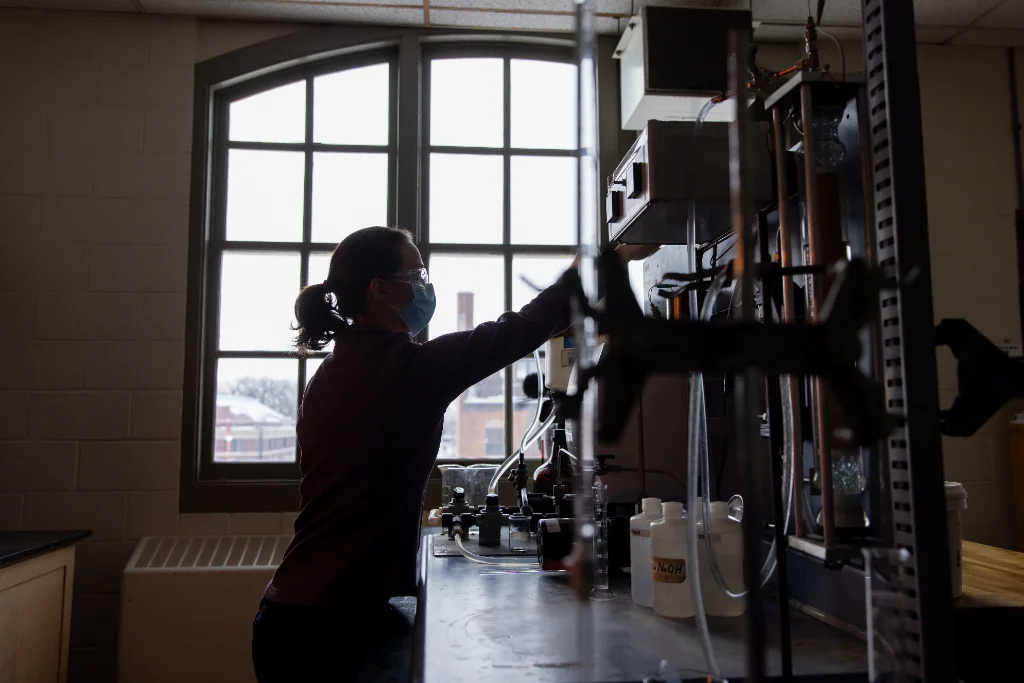
What Can You Do With a Chemical Engineering Degree?
Discover a world of opportunities in chemical engineering careers.
From energy to product development, explore diverse paths and start your journey today!
Request Information
The employment of chemical engineers is projected to grow by 3% from 2024 to 2034. This growth is largely driven by the increasing demand for products that chemical engineers help develop. For instance, they have played a crucial role in creating sustainable biofuels, advanced pharmaceuticals, and innovative materials used in various industries, from construction to electronics.
Given this promising job outlook, chemical engineering is an excellent field for students to consider. But before making that decision, it's important to ask the question: What can you do with a chemical engineering degree? Read on as we explore the diverse and exciting chemical engineering careers you can pursue and discover how this degree can open doors to a wide range of opportunities.
What Is Chemical Engineering?
Chemical engineering is a branch of engineering that applies principles of chemistry, physics, mathematics, and biology to the design, development, and optimization of processes for producing, transforming, and using chemicals, materials, and energy. Professionals in this field work in a wide range of industries, including pharmaceuticals, energy, food and beverages, and environmental engineering, developing innovative solutions to improve efficiency, sustainability, and safety.
12 Chemical Engineering Careers
A degree in chemical engineering opens doors to a diverse array of career opportunities. While many of these roles can be pursued with degrees in related fields, a chemical engineering background offers unique advantages due to its comprehensive approach to process design, materials science, and problem-solving.

Here are some of the career options where a chemical engineering degree is particularly valuable:
Biotechnologist
Average salary: $63,909 per year
A biotechnologist is a scientist who uses biological organisms, systems, or processes to develop innovative products and technologies that address challenges in areas such as healthcare, agriculture, and environmental sustainability.
A career in biotechnology typically requires at least a bachelor's degree. Among other acceptable options, a chemical engineering degree is relevant for biotechnologists working in bioprocessing and biochemical engineering, as it provides a strong foundation in the principles of chemistry, biology, and engineering necessary to design and optimize biological processes.
Chemical Engineer
Average salary: $121,860 per year
Chemical engineers are professionals who apply principles of chemistry, physics, biology, and mathematics to solve problems involving the production or use of chemicals, fuel, drugs, food, and other products. Their work ensures these processes are safe, efficient, and environmentally friendly.
To become a chemical engineer, a bachelor's degree in chemical engineering is essential. This degree provides the necessary knowledge in chemical processes, thermodynamics, and material science. Many chemical engineers also pursue advanced degrees (master's or Ph.D.) to specialize further or engage in research and development roles.
In addition to the degree, many chemical engineers pursue a Professional Engineer (PE) license, which allows them to sign off on projects and take legal responsibility for their work.
Chemical Engineer Consultant
Average salary: $87,487 per year
Consultants of chemical engineers provide expert advice on chemical engineering projects, helping companies optimize processes, solve technical problems, and comply with regulatory requirements. They may work on various projects, from designing new chemical plants to improving existing processes.
These consultants typically require an advanced degree, such as a Master of Engineering in Chemical Engineering or a Ph.D. These advanced degrees provide a deeper understanding of chemical engineering principles and the specialized knowledge required for high-level consulting.
Energy Engineer
Average salary: $98,063 per year
Energy engineers focus on developing and improving energy generation and distribution systems. Their goal is to create systems that reduce energy consumption and minimize environmental impact.
A bachelor's degree in an engineering field is required, with a degree in chemical engineering being suitable due to its strong foundation in energy-related processes and systems. Many energy engineers also pursue specialized master's or Ph.D. degrees in energy engineering or related fields to deepen their expertise and advance their careers. They may even obtain a PE for senior or supervisory positions.
Environmental Engineering
Average salary: $91,191 per year
Environmental engineers use engineering principles to develop solutions for environmental problems. They work on projects related to water and air pollution control, recycling, waste disposal, and public health.
A bachelor's degree in environmental engineering or a related field, such as chemical, civil, or general engineering, is typically required. A chemical engineering degree is highly relevant due to its focus on processes that can impact the environment, making it a strong foundation for a career in environmental engineering.
Materials Engineer
Average salary: $108,310 per year
These engineers develop, process, and test materials used to create different products, from computer chips to aircraft wings. They study the properties and structures of the substances to create new materials with specific characteristics.
A bachelor's degree in materials engineering, technology, or science is typically required. However, a degree in chemical engineering is also acceptable due to its comprehensive coverage of material properties, thermodynamics, and process engineering.
Nuclear Engineer
Average salary: $127,520 per year
Nuclear engineers work on developing and maintaining nuclear energy systems and applying nuclear technology in various fields. They design nuclear equipment, monitor nuclear facility operations, and ensure safety protocols are followed.
Most nuclear engineering jobs require a bachelor's degree in engineering, engineering technologies, or a physical science field, with a master's degree or Ph.D. often needed for research and development roles. A chemical engineering degree is relevant because it focuses on processes involving chemical reactions and materials, which are crucial in nuclear engineering.
Petroleum Engineer
Average salary: $141,280 per year
These engineers work on developing methods for extracting oil and gas from deposits below the Earth's surface. They work on drilling and production operations to maximize the efficiency and safety of oil and gas extraction processes.
A bachelor's degree in petroleum engineering or a related field, such as chemical engineering, is typically required. A chemical engineering degree provides a strong foundation in the chemical processes and materials science necessary for petroleum engineering.
Process engineer
Average salary: $102,075 per year
Process engineers design, implement, and optimize industrial processes, particularly in chemical manufacturing. They work to improve production processes' efficiency, safety, and sustainability, often involving complex chemical reactions.
A bachelor's degree in chemical engineering is typically required, as this degree provides the essential knowledge and skills for designing and optimizing chemical processes. Other acceptable degrees include those in related engineering fields, but chemical engineering is most directly aligned with this role.
Product development engineer
Average salary: $144,072 per year
A product development engineer is responsible for designing, developing, and bringing new products to market. They work on everything from initial concept and design to prototyping, testing, and final production.
To become a product development engineer, you typically need a bachelor's degree in engineering, with a focus on disciplines such as mechanical, electrical, or chemical engineering.
Project Engineer/Manager
Average salary: $112,336 per year
A project engineer or manager oversees engineering projects from conception to completion. They coordinate with cross-functional teams, manage project timelines and budgets, and ensure all project objectives are met. Their role is crucial in delivering projects on time, within budget, and to the required specifications.
A project engineer or manager typically needs a master's degree in a relevant engineering discipline, including chemical engineering, or an MBA for managerial positions specifically.
Quality Control Engineer
Average salary: $81,001 per year
A quality control engineer ensures that products meet the required quality, reliability, and performance standards before they reach the market. They develop and implement quality control systems, conduct tests and inspections, and analyze data to identify and address any defects or areas for improvement.
To become a quality control engineer, you typically need at least a bachelor's degree in an engineering specialty. However, many employers prefer candidates with a master's degree, especially for roles in large companies or complex working environments.
Which career should I choose?
Choosing a career can be daunting, but understanding your interests, strengths, and the nature of each field can help you make an informed decision. Start by considering your interests and passion: what subjects or activities do you enjoy the most, and are you passionate about a particular industry like energy or environment? Next, think about your skills and strengths and consider the work environment you thrive in, whether it's a lab, office, or field setting. Lastly, reflect on your career goals. Are you looking for a high-paying job, job stability, or opportunities for advancement? Do you want to make a significant impact in areas like sustainability or innovation?

Ultimately, the best career choice for you will align with your interests, strengths, and long-term goals. So, take the time to explore your options, research job descriptions and industry trends, and talk to professionals in the field.
Conclusion
Chemical engineering is a broad and versatile field encompassing a wide range of roles and is utilized in numerous industries, from energy and pharmaceuticals to environmental protection and materials science. This diversity offers countless opportunities for those equipped with a chemical engineering degree.
If you're inspired to pursue a career in this dynamic field, consider UND, where we offer a Bachelor's in Chemical Engineering, a combined BS/MS degree, a Master's in Chemical Engineering, and a Ph.D. in Chemical Engineering. These programs are designed to help you not only enter the field but also advance and excel in it. So, join UND and discover the formula for success!
FAQs
Yes, chemical engineers have opportunities for international work, especially in global industries like oil and gas, pharmaceuticals, and environmental engineering, where their skills are in high demand worldwide.
The job outlook for chemical engineers is positive, with employment projected to grow 3% from 2022 to 2032, faster than the average for all occupations.
Beneficial certifications and licenses for chemical engineers include the Professional Engineer license and specialized certifications like Certified Chemical Engineer (CCE) and Certified Safety Professional (CSP).